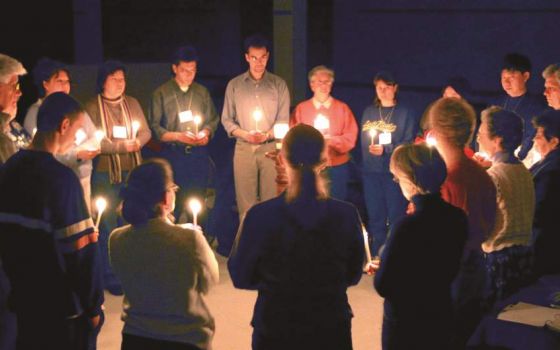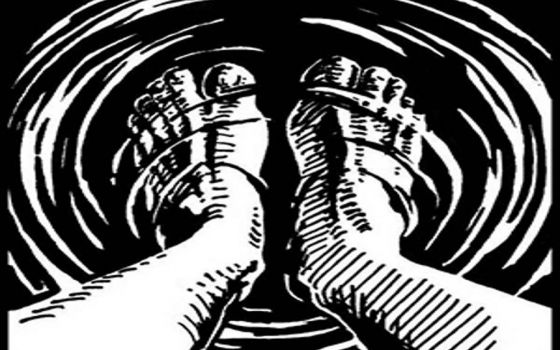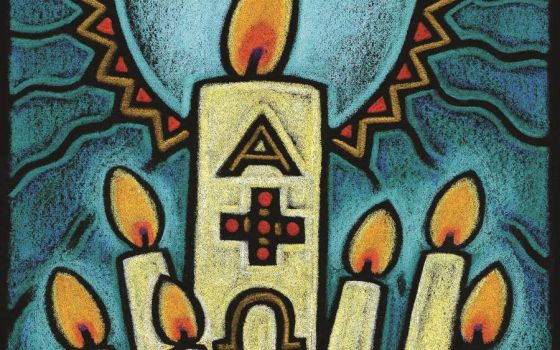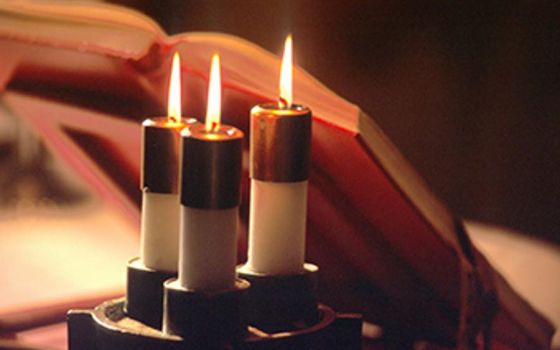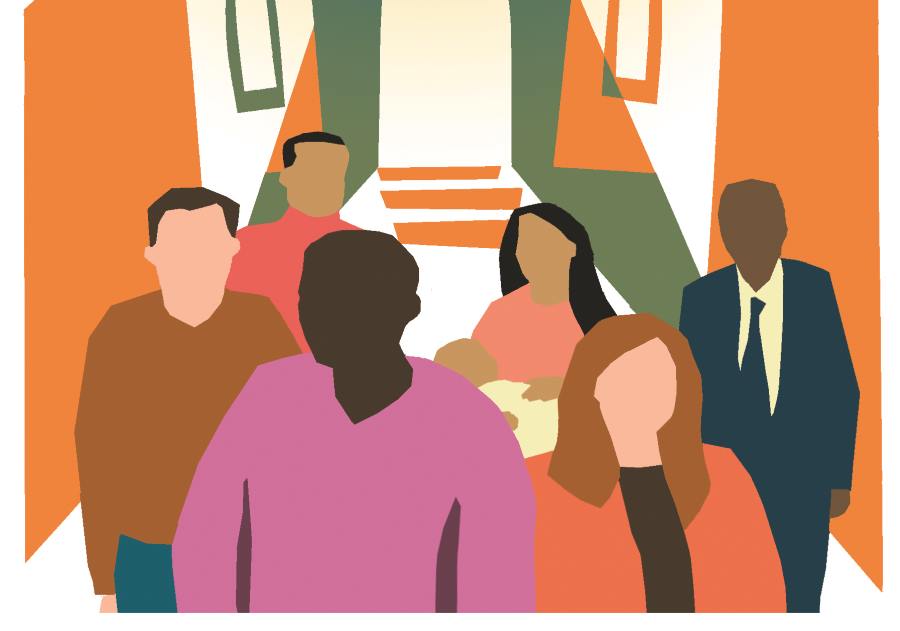
(Julie Lonneman)
Here are two short homilies, one for Holy Thursday, one for Good Friday. The former presumes that the washing of feet is integral to the liturgy of Thursday night, that it will happen after the homily, and that it will be done in such a way as to embrace the whole assembly in this rite. Both homilies presume that the parish has done its best with Lent and comes to the Triduum energized, exhausted, discouraged and in anticipation of the Vigil and its deeds. The content of these two homilies will suggest how a parish might come to think about the Triduum and why it matters so much to the work and witness of a parish.
Holy Thursday
We can think of the year that we keep as the church in two ways. Both are important. The first is very simple. It is the rhythm of the Sundays and the non-Sundays. Our Sunday, the Lord's Day, is counted as the first day, that is the day of creation and the day of the Lord's resurrection, and counted also as the eighth day, the day beyond time. Sunday is where we begin and where we end. That is the day the church assembles, reads the scriptures and ponders them, makes prayers of intercession, gives God thanks and praise over bread and wine and shares all alike at the Table of the Lord. The way we keep Sunday holy is then so essential to the lifelong work of making us Christians.
The other way to think about our year is this: Our year is like a series of circles, each embracing the others. In the center, at the heart of things, is the Vigil we keep here in just 48 hours, the night between Holy Saturday and Easter Sunday. Surrounding that center, flowing to and from that center, are these three days that we are entering tonight. Thurday night to Sunday night. This is the Paschal Triduum, the Easter Three Days. They embrace that Vigil night. From now until the Vigil we prepare. And when it ends we are in Easter Sunday, lingering in the all the sounds and deeds of the Vigil.
But as the Vigil is surrounded by the Three Days, so are the Three Days surrounded. That is the next and bigger circle. We do not get where we are tonight without Lent. The 40 days of Lent prepare us with our various attempts to remake our church and ourselves: praying, fasting and giving alms of time and money and whatever else we can. Lent's work is to bring us back to the life we entered and promised at baptism. We never quite bring it off, but always it sets us down here, in the Three Days.
And if Lent is how we get to the Three Days, then the Easter Season is how we live it out. The 50 days from Easter to Pentecost are like a rehearsal of God's time, God's reign, "thy kingdom come." The song, the smells, the whole tone want to make us bold enough to do what we promised at the font.
Circles within circles, circles over and over like a spiral in our lives: they are the way our church, our tribe, explores the gospel lives we want to live. And we do so the only way we can: together. So we are here together tonight, leaving Lent and its disciplines behind, entering into the Triduum whose heart is the Vigil, two nights away.
And how are we to enter? There is a gate we pass through. We stand before it now and in a few moments will try to pass through. It is the deed we do only tonight, the washing of feet. Something so simple, something so outlandish! We just heard how John's gospel tells not about the bread and wine at the last supper, but about what Jesus did and told his followers to do. And once a year, as a way to take ourselves into the Triduum, as a way to prepare for that Vigil, we do what Jesus asked.
It is such a wonderful deed. Look at it in its simplicity. Someone is willing to bare their feet. Someone is willing to take a basin of water and some soap and to wash the feet of another person. It is a deed that upsets all the expectations of how we act toward one another, a deed that turns the world upside down. To take in one's hands the feet of another person, to give your feet into the hands of another: What does it mean? What does it mean to wash gently and with no hurry, to dry the feet with a towel, perhaps to kiss the feet of this friend or this stranger? Who can say what it means? That is why we do it. We do it to find out what we mean, what being a Christian means, what being baptized into the death and life of Jesus means. Words will never tell us. That is why we have basins and water and soap and towels. That is why we have washing and drying and kisses.
This washing of one another's feet is a vision of how people might live together. We do it but once a year, here on this night when we have finished Lent and want to enter the Three Days, want to get to that night between Saturday and Sunday with its fire, its song, its scriptures, its font of baptism and its table of bread and wine.
Yet it is almost too much for us to accept this messy deed of washing feet and having our feet washed as the way we are to behave ourselves in the world. Who can do that? Who can be baptized with such a baptism? None of us alone, that we know. But we are church and we the church are forever trying to love the world the way God loves it, the way Jesus loved the world on that night before he died.
We the church do not go into these Three Days to escape for a little while. We go into these Three Days to find in them all there is to this world and its life. We are not looking for some other world but for this one, for ourselves who are this world, ready to be washed and fashioned into a world that does justice, that does compassion, that does sharing so scary we can't even think about what will be left for us. "I give you a new commandment," Jesus said, "love one another as I have loved you." And lest we misunderstand and make that into something pretty and vague, Jesus showed us what this love looks like. Now let us see if we can learn such love.
And when we go from here tonight, let us go into the Triduum. Put aside whatever you can of work, put aside everything of entertainment, put aside most eating and chatter, put aside distractions. Let us see if we can get one another from here to the Vigil, with many opportunities to gather and pray in one another's company.
Good Friday
With soap, water, basins and towels we left Lent behind last night. Washing one another's feet we began to see and to feel and just barely to understand what the church is doing in these three days. We entered the Three Days singing about the cross and proclaiming that the cross is our life and that the cross is for us resurrection. Clearly, we did not enter into some time of watching a movie about the passion and death of Jesus. What we entered was a three-day engagement, a three-day grappling with the stories and the deeds that reveal to us who we are and what our church's life is to be about. Last night we heard of doorposts marked with blood and death passing over. We heard of how sharing the bread we eat here and the wine we drink here proclaims the death of the Lord until the Lord comes. We heard the new commandment.
From then until now the first of the Three Days has been passing. We gather again on this Good Friday because we need to be with each other often in the Three Days. The truth is: We do not keep these days by squeezing in time to go to church on Thursday night and on Friday afternoon or evening. The Three Days are all, all the hours and minutes whether we are in church or not. All of today and all of tomorrow are for us to get ready for tomorrow night, for our gathering in the darkness, making the fire, listening to many scriptures, calling on the saints to go with us to the font and there doing the baptizing in much water, the anointing with much oil, and all together then we go to the table where we do the work of every Sunday: the church giving praise and intercession, lament and thanks, to God over the gifts of bread and wine.
Advertisement
It takes all of thoday, all of tomorrow, to be ready. It takes living as much of these days as we possibly can in a kind of fasting. This is not only from food, but from the routine, from the work, from the distraction, from the entertainment, from the chatter. We have something to do here tomorrow night and that something is so mighty and so frightening that it steals away our appetites, our agendas. The church hungers and thirsts for the once-a-year deeds we will do tomorrow night. The church hungers and thirsts to light that fire, to spend precious time with words of scripture texts that we hold dear, and most of all we hunger and thirst to go with the elect, the catechumens, to the waters of baptism and there to embrace them and let them lead us to the table.
Now, in the midst of these first two days, we have come together to ponder what those waters hold: life in this Christ who preached and who did wonders, who told parables and who proclaimed God's reign, who was taken and sentenced and tortured and executed. It is life in this Christ whom we proclaim Lord. So we have listened to Isaiah's words about someone no one would help, someone expendable. And we have heard John the evangelist's telling of the story: this Jesus who reigns from the cross.
What remains for us in this assembly today is to linger in intercession. Every Sunday when we assemble we make prayers of intercession for the world and all its troubles, for the church, the sick, those who have died. But on this Good Friday we are able to manifest just how vital is this intercession. We hear one after the other some of the things that we must bring before God. We must, we are baptized to do this. We are baptized to be the ones on earth who are constantly paying attention to what is needed from God, attention to the wars and suffering, the poverty and oppression, the sickness and loneliness, the breaking down of relationships, the greed and terror. We are alone and together to bring this before God with loud cries. So we do this today, standing and kneeling, we the church will cry out to God as we must every time we gather, and every day of our lives in our homes.
What we do after this intercession is, like the washing of feet last night, done but once a year. We hold high the cross and proclaim what still seems nonsense even to us: That here, the cross that is the shape of Christian life and prayer, here is life and here is truth and here is the way. And then, we the church, we come together and we come one by one and we put ourselves before our assembly's image of that cross and we kiss that cross, or we embrace it, or we touch it with tenderness, or we bow or we kneel silently. There is to be no hurry here. We aren't going anywhere, are we? This is where we are going. It is the Triduum and we have this treasure of time to prepare ourselves for the Vigil tomorrow night.
When we end our prayer together, we go quietly or we stay here a bit. It is the Triduum. We have another day to be fasting from food and work and entertainment and all the usual stuff of our lives so that we can be filled with anticipation of what we dare to do here on Saturday night when we keep the Vigil.
Editor's note: This reflection was originally published in the April 2007 issue of Celebration. Sign up to receive daily Lenten reflections.





